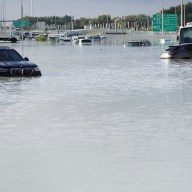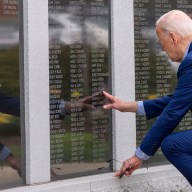 Hazmat workers decontaminate a Dallas apartment. Photo credit: Getty Images
Hazmat workers decontaminate a Dallas apartment. Photo credit: Getty Images
Another day, another Ebola scare in New York City. And though the very-real threat lingers, there still haven’t been any confirmed cases in the city.
According to the city’s Department of Hygiene and Mental Health and the Centers for Disease Control and Prevention’s most recent numbers, 88 potential cases were reported by health care providers as of Oct. 6. Of those 88 cases, only 11 met the risk criteria; one patient tested negative for the virus and the remaining were diagnosed with illnesses such as malaria.
“It happened in Texas, it can happen here,” said Oretha Bestman-Yates, president of the Staten Island Liberian Community Association. “It just took that one infected person to get on that plane to come.”
Clifton, Staten Island, is home to the largest Liberian community outside of Africa. And while the virus is spreading in other West African countries such as Sierra Leone and Guinea, Bestman-Yates said Liberia, with more than 2,300 deaths so far according to the World Health Organization, is the “face of Ebola.”
Bestman-Yates she said she was recently at an airport when a reporter called to talk about Ebola. “People moved away from me,” she said, when she mentioned Liberia on the phone.
And though media attention has other hurtful effects for Liberians in New York, Bestman-Yates believes the attention is an educational opportunity.
“We have to be prepared for the worst, we can’t assume it won’t come here” Bestman-Yates said.
Paul Tuider, president of the Liberian Communities of New York, said many Liberians he knows don’t like the heightened media attention.
“Our image is at stake,” Tuider said, adding his young niece, born in America, is the subject of “Ebola jokes” at school, and adults are the subject of negative comments at work.
With all the perceptions in New York, Tuider said many Liberian’s main concern is raising money to send back home, and their family members there.
“We’re hoping with the great help of the government it won’t spread … hopefully the international community will help stop it,” Tuider said.
Ebola is a serious virus spread through direct contact with an infected person’s bodily fluids. More information is available on the health department’s website.














